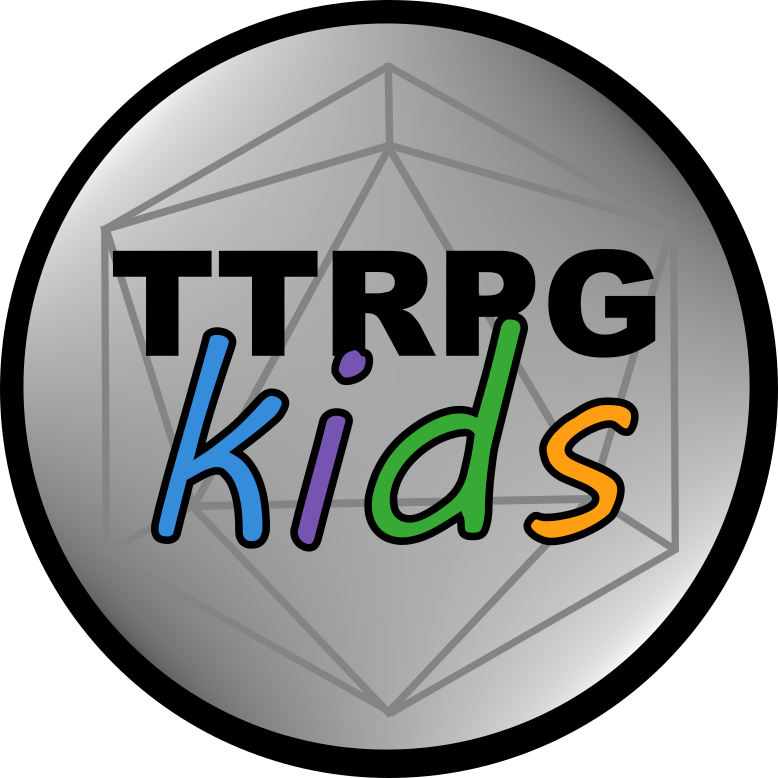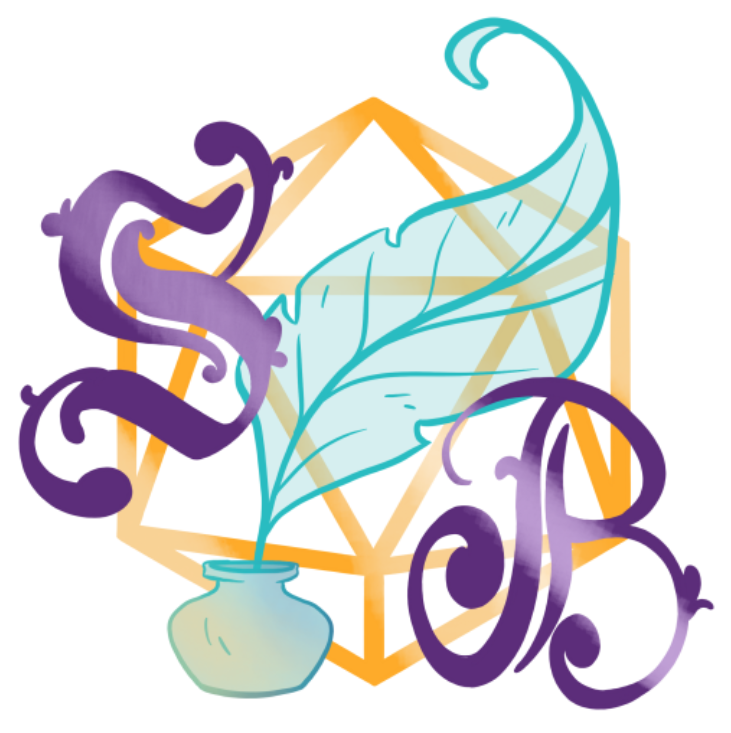TTRPGkids interview: Scriv the Bard talks about tabletop games for kids and Bard RPG!
Can you tell us a little about yourself?
Hi, I’m Scriv!
I am a cultural psychologist by profession, by trade, and a freelance game designer by passion. In my regular day job, I spend a lot of my time doing what appears to be a lot of reading the news and researching to better understand different cultures, different perspectives and world views, to find better ways to work with different people from different communities and to do outreach programs.
When I started doing game design, that was a fun lens to look at game design and worldbuilding through. I try to approach those different things in my approach to gaming and writing.
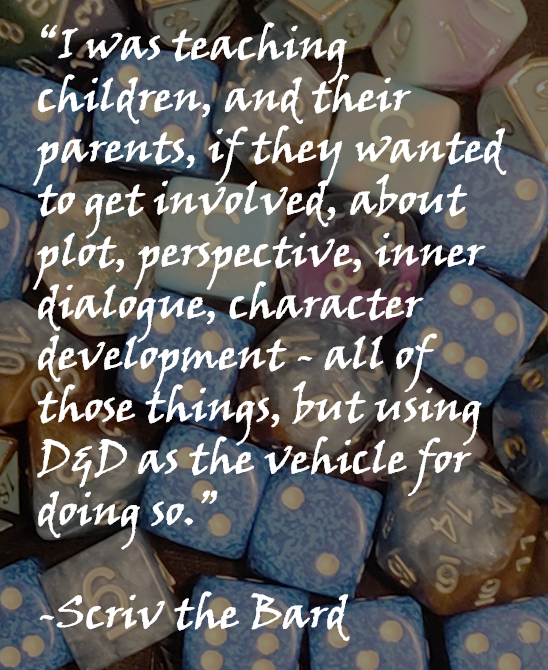
I got my start with TTRPG’s as a game design, actually not by original writing and designing games, but by running D&D storytelling workshops for kids. I had been playing Dungeons and Dragons and Dread for a while, but my first step as a creator was through running those workshops. I was teaching children, and their parents, if they wanted to get involved, about plot, perspective, inner dialogue, character development – all of those things, but using D&D as the vehicle for doing so.
That sort of snowballed into articles and doing custom adventures and running family-friendly campaigns for the local community, and now, we’re here with Bard RPG.
It’s been a few years in the making, and I have loved it. I have always enjoyed storytelling ever since I was little and never thought I would find as much fulfillment as I do in this kind of world. It’s been life changing.
When did you start playing tabletop RPG’s?
I had played TTRPG’s a few years before the workshops. I’m not an old hat who was playing in middle school and high school. Unfortunately, I never quite found the right friend group who would be that gateway for me.
I first started probably 2014 – there was a coworker who offered to run D&D for a Halloween one shot at our house party, and I was hooked. So, there was that one with them as the DM, and the group sort of petered out a bit, so I decided, you know what… I want to DM! That began the forever GM journey. I started with D&D, I got real into Critical Role, like so many did, and found a lot of inspiration out there on the interwebs.
Critical Role oopened my eyes to how creative it could be with the system. The way I had played before with the other DM, who is a very good storyteller, felt a little rigid. I soon realized that I prefer a much more narrative, free flowing, open world approach, as much as it can be when running a game like D&D.
What was your favorite tabletop RPG moment?
There are so many favorites! I will give my favorite moment as a GM and my favorite moment as a player.
As a GM, my favorite moment was when running the family-friend campaigns. The original, OG, Heroes of Lyastera, there were two different campaign groups of varying ages with the youngest being 6 and the oldest child being 13.
One of my favorite moments was when the 6 year old, a little girl who wanted to play a dwarf paladin, had been kind of quiet at first and a bit subdued. Her older brother, who was a few years older, was really outspoken and very engaged…. and a little rules lawyer. He had that monster manual and everything memorized, and it was amazing! But, the moment where the little girl came into her own as this amazing, brave, dwarf paladin warrior stepping into the center of the ring and calling out her brother a little bit and being more engaged with the older kids. She was coming into her confidence, and seeing that transition is definitely one of my favorite moments.
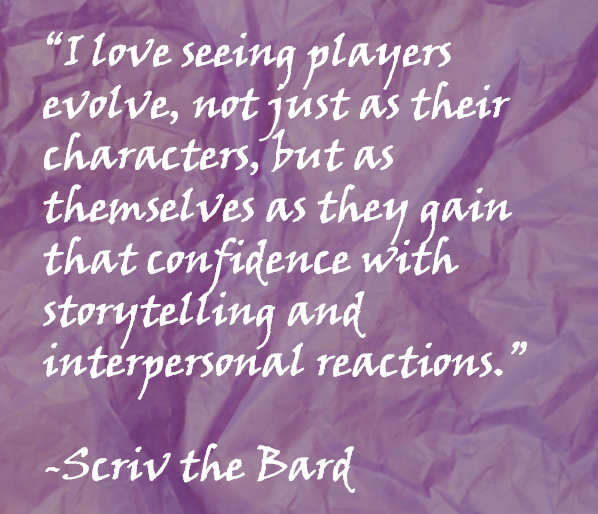
I love seeing players evolve, not just as their characters, but as themselves as they gain that confidence with storytelling and interpersonal reactions. It was very fulfilling, and it made me really happy to see how much she was diving in and letting go of some of those inhibitions.
I fully attribute this journey to having those types of experiences early on. Before starting the website and before the Scriv part of my personality really started coming out – I owe it in large part to them.
As a player, this one caught me off guard. This before the articles and kid’s workshops. It was one of those moments that I realized you can really work through some interesting emotions through D&D.
One of my friends was DM’ing, and it was just a short period, a few months, after I had lost my mother. I was working through a lot at the time, and there was a moment when the DM introduced a mother figure into the story. They weren’t doing this consciously in any way.
It was a sentient weapon that ended up almost taking on a maternal kind of role. I didn’t realize it at first, but as the sessions went on and on, it kind of hit me. Subconsciously, this is almost becoming an avenue for working through some things and saying things I wanted to say to my mother. It ended up hitting me in quite an emotional but positive way.
We stopped during one of our breaks, and I took my friend aside to say sorry for getting a bit emotional. I opened up a bit, and we talked about it, and they were very supportive and offered to change it. I felt like I wanted to keep it, it was something that maybe I needed, but I wanted to talk about it as a group. You never want to bring emotionally loaded things to the game table without everyone being aware of it.
That was my first experience really having that sort of situation, and I learned a lot, and it was very cathartic. It opened my eyes up to there being a healing nature to TTRPG’s when done a certain way.
That was a shaping moment for later one when I was thinking about how you do session zero and how you do safety tools. I think about that moment quite a bit.
If that hadn’t happened, I don’t think I would have made that connection between my mother’s legacy of storytelling and having that connection to TTRPG’s and writing and game design as quickly as I did because it was a deliberate decision point after that. My mom would love this; she would get a kick out of it, she would pour her own emotions and inspiration into it. This is going to be part of my inspiration tapestry that I carry with me.
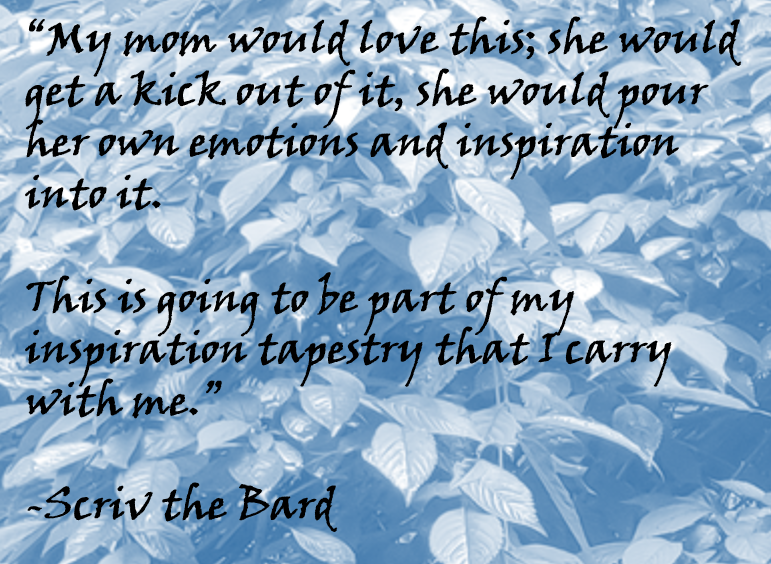
What inspired you to make Bard RPG?
Along with that tapestry of little threads that I picked up for game design, the inspiration for Bard RPG definitely came from those session with kids and a desire to create a game that could be enjoyed by the whole family.
Starting with D&D, we ended up having to change and homebrew so much. I made a kid-friendly character sheet and switched up the mechanics so much to be able to introduce both young and older players. We kind of realized, we’re changing so much about this.
I had ideas about Bard RPG before we fully switched over on the twitch stream, but I realized that at a certain point, the style of play that we enjoyed… D&D just really didn’t cut it anymore. It is a very fun system for specific types of storytelling, I think, but I wanted something different.
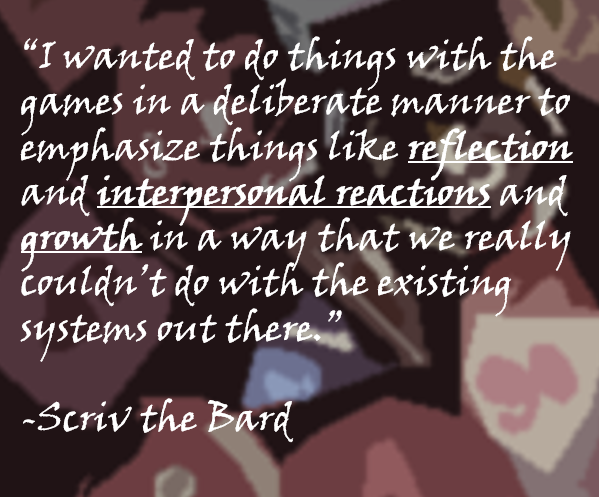
I wanted to do things with the games in a deliberate manner to emphasize things like reflection and interpersonal reactions and growth in a way that we really couldn’t do with the existing systems out there. I wanted to pull from my own background in psychology and from storytelling, oral storytelling, in particular. I wanted to create a system that captured all of that.
I don’t think it was one specific instance of inspiration, but more several different factors that smoothly coalesced into an idea.
I also wanted to find a style of play and create a system for younger players to pick up and GM as well. I could see how many of them wanted to, but they ended up feeling a little discouraged or apprehensive with a very rules-crunchy type of system. They look at the book and think about having to memorize all this, but I tell them, no, the books are there so you can reference them later on if you want to, but.. Focus on what story you want to tell. What sounds cool? What sounds fun? And then how can we change the rules to make that work.
With Bard RPG, I hope that the rules are designed so it is intuitive. You can take the rulebook or the quick guide and just go with it. Whether it is a big campaign that you’ve spent hours prepping for or something like what we did a few weeks ago in a spontaneous one shot, you’re just making it up as you go along. I wanted it to be adaptable.
What makes Bard RPG unique compared to other tabletop RPG’s?
Bard RPG is genre agnostic, so this is not specifically designed for fantasy or sci-fi or horror or anything else. All of the mechanics can be applied to any world or any story that you want to play in. For any book or movie you want to try, instead of having to reskin all of these thing, you can take that kind of story and just say… alright! Bard RPG. We can use this system.
The character classes, for example, are based off the 12 Jungian archetypes that are present throughout any type of story, and they have roots in psychology. It’s how we see ourselves and interact with the world. They are described as these timeless personas that we end up seeing and seeing ourselves in throughout history and throughout generations of storytelling. You have these different types of characterizations that you can adapt easily.
For example, you have the will sub archetypes, which are focused on the wishes and ideals that motivate you. Why do you do things the way you do? Why do you wish for certain things? Why do you fear certain things?
That’s the first aspect of your character building – you fill out your will sub archetype. Then, once you’ve figured out your will, you soul and heart and why of your character, then you can figure out your ability sub archetype. If that’s my motivation, what kind of actions does that drive?
There’s the sage, explorer, caregiver, magician, jester, artist, inventor – that determines what kind of aspects you are strong in.
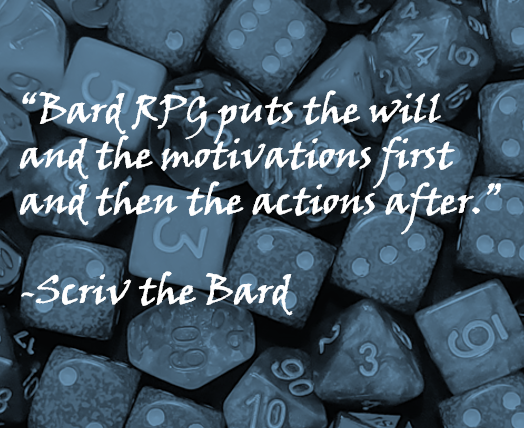
Bard RPG puts the will and the motivations first and then the actions after. That was done very deliberately because I want to encourage mindful action with this game. I think that so often in life, for good or bad, we tend to act first and then think about it later. In a lot of our day-to-day actions, and in a lot of our cultures, we don’t really think things through before we really jump in and do something, so I want to tap into that, especially with younger gamers to develop self reflection.
Another other unique element is that we don’t have hit points or long lists of spells or skill checks to memorize and do a whole bunch of math with. The way that you act and drive the plot forward is by using one of four action domains.
Every character, every archetype combination, has access to the same four domains: physical, social, supernatural, and technological. Taking a bit of inspiration from the MBTI personality stacks, you have your action stack.
Depending on your action sub archetype, you’ll have your primary, secondary, tertiary, and inferior actions. You’ll roll at 5d6 for your primary then 4 to 3 to 2 d6’s down to your inferior. You don’t have additional numbers to add to it, you’re just rolling the dice, and that’s what you have, but it’ll be balanced based on that archetype.
You have a reference action wheel with the domains broken up showing some examples, just for inspiration, for what you can do. To adjust use with different genres, filling out that action wheel is the only thing that should need adjustment or tweaking.
What advice do you have for people who are new to tabletop RPG’s or who are looking to introduce a new player (kids, teens, or adults)?
If you have a story that you want to tell, do not let the rules and mechanics get in the way. They should give you guidelines for how to progress the story, but they should never stop or limit the story. So, do not get stressed out about the rules and mechanics, think about the story you want to tell and really embrace that creativity.
For new players who are embarrassed about maybe roleplaying, of course, talk about that at the table, but also encourage and ask, what would your inner child do? Tap into your inner child. Think back to that time playing pretend or using your imagination in the backyard or with your siblings or friends at school. You’re releasing inhibitions; don’t think about if this is the right or wrong way to tell this story. Think about what is driving that inner child and really hold onto that.
Thank you Scriv for doing the interview!
And for anyone looking to find Bard RPG, check it out here on kickstarter!
